Nigel Bird's Blog, page 54
March 28, 2013
One Man's Opinion: ALL THE WILD CHILDREN by JOSH STALLINGS
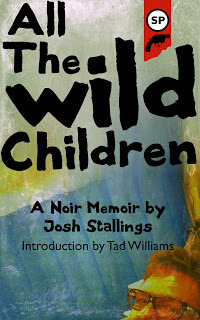 Before I move on, I want to let you know that I have a giveway going on. You can get a copy of my novel In Loco Parentis (if you haven't already picked one up) today and over the Easter Weekend for free. It's at Amazon UK and US. I'd be much obliged if you'd take a punt. I'd be even more obliged if you passed the message on to your friends (or your enemies, come to think of it). And now the star attraction. Ladies and gentlemen...I don’t read many memoirs – Chaplin’s auto-biography is grand, Bukowski’s work mind-blowingly good (though blurring fact and fiction), and Tobias Wolff interesting enough. I think the reason I don’t read more of them is that they don’t really grab me, which makes them a struggle and a challenge that I’m not prepared to take on.
Before I move on, I want to let you know that I have a giveway going on. You can get a copy of my novel In Loco Parentis (if you haven't already picked one up) today and over the Easter Weekend for free. It's at Amazon UK and US. I'd be much obliged if you'd take a punt. I'd be even more obliged if you passed the message on to your friends (or your enemies, come to think of it). And now the star attraction. Ladies and gentlemen...I don’t read many memoirs – Chaplin’s auto-biography is grand, Bukowski’s work mind-blowingly good (though blurring fact and fiction), and Tobias Wolff interesting enough. I think the reason I don’t read more of them is that they don’t really grab me, which makes them a struggle and a challenge that I’m not prepared to take on. All The Wild Children (US) is totally different. It has a quality to it that made it compelling for me from start to finish.
In it, Josh Stallings tells his life story. It’s one hell of a story, I promise you that, with ups and downs and round-and-rounds that would have felled weaker individuals.
His adult working life has been spent in cutting rooms, slicing and piecing together trailers for films. He clearly did it very well and some of his achievements you’ll recognise when you read them. This is relevant to what he’s done in the book. Somehow, he’s been able to see his whole life and then write it so that it cuts back and forth between the moments from the past and the present in ways that complement each other very powerfully indeed. He has the ability to forge links between events so that the bigger perspective can be seen. I found the style breathtaking and he had me riding through the book with a full range of my emotions fully engaged and occasionally over-spilling. It's seamless.
I think that Josh is a natural born poet. I believe that any chunk of 200 words can be taken as a random sample and will give a line that will have the power to give you a physical reaction. I noted a few then decided I’d just rather go with the flow. Here are some of them in case you want a little taste:
‘Sometimes life is stranger than drugs.’
‘There will be Quaaludes with Ingrid...there will be amyl nitrate poppers in gay discos...there will be acid with Tomas...there will be mushrooms with my father...there will be an ocean of whiskey. And at the end of it all, none of it will be enough to stop the pain in my gut. None of it will quiet the fire in my head.’
‘In Golden Gate Park Janis Joplin is playing with Big Brother and the Holding Company.’
‘Here’s the trick to winning a war. You just need to be willing to suffer more casualties than the other guy.’
‘Booze flows through my youth like a river.’
‘Childhood prepared me to be very good at moving. It’s staying put that I have to learn to do.’
I put these in to give a flavour of the book, but they can’t do it justice on their own.
I saw myself in many of the stories (for me, it's my adult self, whereas Josh was only a kid). That helped make it interesting.
I saw things that to me conjure up what I might once have described as heaven – the Janis Joplin thing, the Hollywood scene, the crime, the clubs and strip bars, the sex, the commune and the high-school battle-grounds, the drugs and rock and roll, the violence and the excitement of it all. Life for Josh Stallings was never dull.
Why I would no longer think of such a life as heaven is the experience that has shown me that lows follow highs, that self-medication will eventually see you running on empty, that people need to be treated with respect rather than as accessories. Josh found the same, only he says it much better than I do. Read and learn. Read and learn.
What is particularly poignant is the loop Josh takes when recounting his life as a father in relation to his family history and his own life. It’s amazing to watch on.
Closest thing I can come to here is a book I read recently, The Outsiders. Something in the tone and the lifestyle of the boys growing up alone. There's something in the way simple language provokes a huge reaction and there's a tiny sharing of flavouts in parts of the voice maybe. Check it out and see if you can tell me what I mean by that – I’d be glad to hear from you.
I was sorry to come to the end of this one. I miss my friend already. My friend in this book who has taken me on a journey with him. His voice was always interesting and entertaining.
I’ve rarely felt so emotionally engaged with a collection of words. I did cry, and that really doesn’t happen often when I read books. I felt adrenaline pump, hid behind my imagination’s sofa, squinted, felt the pain and the joy and the bewilderment every step of the way.
The pace and style of this makes it gripping and compelling reading throughout.
Read this book if you need solace; if you love humanity; if you’re curious about the Sixties; if you want support; if you're broken and need help and inspiration; need to give up one of your crutches; or if you love fantastic stories.
I could go on and know I shouldn’t.
This read is brilliant.
Josh wonders what he was supposed to be in life. What he was aiming for. I can tell him now. In terms of his creative self, he lived a life like he’s had so far in order that he could write this amazing memoir.
Enough said.
Sometimes 5 stars just aren’t enough.
Published on March 28, 2013 06:48
March 27, 2013
Rock Lobster, Rock. Goodreads Giveaway.
I've set up a Goodreads giveaway for The Rocks Below in case you feel like taking a gentle punt.
Here's where to check in:
http://www.goodreads.com/book/show/17675805.The_Rocks_Below
In the meantime, in a bid to get the juices flowing, here are the reviews to date:
"5 stars Aesop Is Appauding March 26, 2013
By A. J. Hayes
Format:Kindle Edition
Apollonius of Tyana said of the Greek tale teller Aesop: like those who dine well off the plainest dishes, he made use of humble incidents to teach great truths
In "The Rocks Below" Nigel Bird proves that he is much the same as that revered old scribe. Slowly and easily, through the multiple of points of view of the inhabitants of a small seaside town it becomes plain that . . . something . . . is happening. Something strange and deadly and unknown. And there are monsters out there in the dark. Hungry ones.
Yeah, it does sound like a horror movie, doesn't it? But, as you read along, you will find it's not at all like that. You will find it's story about people you'd like to know in a town you'd like to visit and, somehow, you know, just know, that everything is going to be all right. At least you keep hoping that is the case and as it turns out . . . well I'm not going to spoil the story, now am I? Just read it for yourself and find out. It will give you a shudder and lots of laughter and maybe a tear or two and, just like that old, bearded and wise Greek slave, teach you, without a trace of preaching, a valuable truth that applies to this oh-so-modern day and age completely.
Totally enjoyable read from a master story teller." and "5.0 out of 5 stars Captivating! 19 Mar 2013
By Jonny_S
Format:Kindle Edition|Amazon Verified Purchase
This book was full of surprises and a bit scary at some points. One of the best books that I have read. I read this book from start to finish. I couldn't put it down. I kept reading even when I was tired and my mum found me with my glasses still on asleep. I would recommend it to all. Angus (age 11)" Big thanks to those reviewers, by the way. I think that youngsters distilling their thoughts and putting them down is to be encouraged and applauded. One spring chicken and one evergreen - how delightful.
Here's where to check in:
http://www.goodreads.com/book/show/17675805.The_Rocks_Below
In the meantime, in a bid to get the juices flowing, here are the reviews to date:
"5 stars Aesop Is Appauding March 26, 2013
By A. J. Hayes
Format:Kindle Edition
Apollonius of Tyana said of the Greek tale teller Aesop: like those who dine well off the plainest dishes, he made use of humble incidents to teach great truths
In "The Rocks Below" Nigel Bird proves that he is much the same as that revered old scribe. Slowly and easily, through the multiple of points of view of the inhabitants of a small seaside town it becomes plain that . . . something . . . is happening. Something strange and deadly and unknown. And there are monsters out there in the dark. Hungry ones.
Yeah, it does sound like a horror movie, doesn't it? But, as you read along, you will find it's not at all like that. You will find it's story about people you'd like to know in a town you'd like to visit and, somehow, you know, just know, that everything is going to be all right. At least you keep hoping that is the case and as it turns out . . . well I'm not going to spoil the story, now am I? Just read it for yourself and find out. It will give you a shudder and lots of laughter and maybe a tear or two and, just like that old, bearded and wise Greek slave, teach you, without a trace of preaching, a valuable truth that applies to this oh-so-modern day and age completely.
Totally enjoyable read from a master story teller." and "5.0 out of 5 stars Captivating! 19 Mar 2013
By Jonny_S
Format:Kindle Edition|Amazon Verified Purchase
This book was full of surprises and a bit scary at some points. One of the best books that I have read. I read this book from start to finish. I couldn't put it down. I kept reading even when I was tired and my mum found me with my glasses still on asleep. I would recommend it to all. Angus (age 11)" Big thanks to those reviewers, by the way. I think that youngsters distilling their thoughts and putting them down is to be encouraged and applauded. One spring chicken and one evergreen - how delightful.
Published on March 27, 2013 01:34
March 26, 2013
Success Criteria
It's the beginning of the Easter holidays.
Downstairs, my children are playing Victorian schools and I hear the teacher asking the pupils (both of them) to stick their success criteria into their books. How things have changed.
Having been a teacher for 25 years now, I've seen many things come and go. Among those in the come pile is the idea of success criteria for every lesson. What tickles me is that it's usually used in the singular - there is only one success criterion - and if that's what we teachers do, what hope is there? Actually lots, but that's another story.
When I go back after the break, my hours will have been reduced to 0.5. I'll be working Mondays, Tuesdays and alternate Fridays. It was at my request, so I'm really pleased. I'm also lucky enough to have a boss who will generally bend as far as she can to facilitate her staff (nothing crude intended, please!).
You might wonder whether that's because I'm doing so well as a writer that I can afford such a move with ease. You might also picture me writing a whole lot more in the future and that might even please you.
The truth of the matter is slightly different.
My first motivation is based upon my need to feel I'm around for the three children who are playing at schools. After doing a PHD and being unemployed for a while, my wife has landed a really interesting and good job. It's also a full-time one. That means she just can't be around for the children in the way that she's been able to since Nancy was born.
I'd already taken Wednesdays off to be around for the family (and to avoid some of the stresses of teaching and also the damage to my mental health), but that didn't seem enough.
Instead of being financially comfortable for the first time in many years, we decided that money wasn't important enough and that we can manage with a new regime.
That makes me nervous. We won't be as stable as we might have been and it might just take a strong gust of wind to cause a serious tumble. It matters not. I'm pretty sure I'm doing the right thing.
How can I feel so secure in that notion?
Answer - I'm reading All The Wild Children, a memoir by Josh Stallings. It's such a wonderful book that I don't really want to finish it. As I work my way through it, I feel I'm in the company of a good friend and I like having him around.
Thing is, Josh describes a life of sex and drugs and rock and roll forged from the need for him to bring himself up with the help of his siblings. They do crazy and brilliant things in the absence of parents and he tells it all with an openness and a voice that is truly amazing. In many ways his life reminds me of mine, yet there are so many differences. What I have to remember about my own highs is that they came when I was a teenager and as an adult instead of a young child (Josh had his fingers into everything well before puberty, how mad is that?).
If I asked, I think Josh would tell me this. If you're going to be a parent, be there for your kids. Hell, they may well screw up things anyway, but that's part of what they have to do to learn. Be there for your kids and you can at least know that you've done what you could. You may also have set a model for how things can be and how strong and loving a home can be.
Sure, I blow it a lot of the time - parenting that is. I'm not a perfect dad by a long chalk. I do know that I'm trying, though, and I hope that's what they'll remember.
I'll be reviewing All The Wild Children later in the week, so keep an eye.
Another treat from the book is watching him change his expectations of himself and what he wants to be.
I've wanted to be a writer for many, many years.
It's what I am now. Because I write and have written. There are no real success criteria to prove that other than that I've produced work.
I did want to be in The Velvet Underground. I wanted to be Elvis and Charlie Parker. I wanted to be F Scott Fitzgerald or one of his pals. Now, I reckon, I want to be Nigel Bird.
My current success criteria (to be amended where necessary):
I'm around for my children during the good times and bad.
I offer the kids a range of experiences which they'll enjoy.
I'll teach well on my 2 days a week and show the children I work with that they can achieve in many different ways and that the world isn't always linear (like a tight-rope they're so in danger of falling off). In fact, I'll be a safety net.
I'll keep a clean house and improve my cooking (I can hope for miracles, no?)
I'll write whatever I want as well as I can.
I'll die in my sleep in the middle of a dream about my grandchildren, with sea air in my nostrils.
Downstairs, my children are playing Victorian schools and I hear the teacher asking the pupils (both of them) to stick their success criteria into their books. How things have changed.
Having been a teacher for 25 years now, I've seen many things come and go. Among those in the come pile is the idea of success criteria for every lesson. What tickles me is that it's usually used in the singular - there is only one success criterion - and if that's what we teachers do, what hope is there? Actually lots, but that's another story.
When I go back after the break, my hours will have been reduced to 0.5. I'll be working Mondays, Tuesdays and alternate Fridays. It was at my request, so I'm really pleased. I'm also lucky enough to have a boss who will generally bend as far as she can to facilitate her staff (nothing crude intended, please!).
You might wonder whether that's because I'm doing so well as a writer that I can afford such a move with ease. You might also picture me writing a whole lot more in the future and that might even please you.
The truth of the matter is slightly different.
My first motivation is based upon my need to feel I'm around for the three children who are playing at schools. After doing a PHD and being unemployed for a while, my wife has landed a really interesting and good job. It's also a full-time one. That means she just can't be around for the children in the way that she's been able to since Nancy was born.
I'd already taken Wednesdays off to be around for the family (and to avoid some of the stresses of teaching and also the damage to my mental health), but that didn't seem enough.
Instead of being financially comfortable for the first time in many years, we decided that money wasn't important enough and that we can manage with a new regime.
That makes me nervous. We won't be as stable as we might have been and it might just take a strong gust of wind to cause a serious tumble. It matters not. I'm pretty sure I'm doing the right thing.
How can I feel so secure in that notion?
Answer - I'm reading All The Wild Children, a memoir by Josh Stallings. It's such a wonderful book that I don't really want to finish it. As I work my way through it, I feel I'm in the company of a good friend and I like having him around.
Thing is, Josh describes a life of sex and drugs and rock and roll forged from the need for him to bring himself up with the help of his siblings. They do crazy and brilliant things in the absence of parents and he tells it all with an openness and a voice that is truly amazing. In many ways his life reminds me of mine, yet there are so many differences. What I have to remember about my own highs is that they came when I was a teenager and as an adult instead of a young child (Josh had his fingers into everything well before puberty, how mad is that?).
If I asked, I think Josh would tell me this. If you're going to be a parent, be there for your kids. Hell, they may well screw up things anyway, but that's part of what they have to do to learn. Be there for your kids and you can at least know that you've done what you could. You may also have set a model for how things can be and how strong and loving a home can be.
Sure, I blow it a lot of the time - parenting that is. I'm not a perfect dad by a long chalk. I do know that I'm trying, though, and I hope that's what they'll remember.
I'll be reviewing All The Wild Children later in the week, so keep an eye.
Another treat from the book is watching him change his expectations of himself and what he wants to be.
I've wanted to be a writer for many, many years.
It's what I am now. Because I write and have written. There are no real success criteria to prove that other than that I've produced work.
I did want to be in The Velvet Underground. I wanted to be Elvis and Charlie Parker. I wanted to be F Scott Fitzgerald or one of his pals. Now, I reckon, I want to be Nigel Bird.
My current success criteria (to be amended where necessary):
I'm around for my children during the good times and bad.
I offer the kids a range of experiences which they'll enjoy.
I'll teach well on my 2 days a week and show the children I work with that they can achieve in many different ways and that the world isn't always linear (like a tight-rope they're so in danger of falling off). In fact, I'll be a safety net.
I'll keep a clean house and improve my cooking (I can hope for miracles, no?)
I'll write whatever I want as well as I can.
I'll die in my sleep in the middle of a dream about my grandchildren, with sea air in my nostrils.
Published on March 26, 2013 05:26
March 22, 2013
Harsh Compassion by Rory Costello

I love a good oxymoron. As the author of the “Beat on the Brat” story collection, Nigel Bird too may enjoy “intelligent dumbness,” a description applied to The Ramones. This kind of duality appeals to me in reading experiences as well. Quite often, I find that bleakness, once you make it through to the other side, is oddly uplifting.
Recently, a friend’s comment brought Nelson Algren (1909-1981) back to mind. Right after New Year’s 2013, this blog post called Algren “the great, forgotten progressive writer that you should know.” Anotherjust a few weeks before concurred, saying, “At some point, American letters forgot about Nelson Algren.” I had been vaguely aware of Algren in the past – I’d picked up A Walk on the Wild Side for 50 cents or so from a street book table, and I paid full price in a bookstore for The Man with the Golden Arm. That was around 2010, but I never got around to reading either until last year.
The edition of The Man with the GoldenArm that I got had a really nice bonus – a superb introductory essay called “The Harsh Compassion of Nelson Algren.” It was written in 1990 by James R. Giles, who is now Professor Emeritus of English Literature at NorthernIllinois University– not far from Chicago, the city so closely connected to Algren’s life and work.
Giles’ oxymoron immediately intrigued me. He focused on a key aspect of Algren’s vision – “an unrelenting absurdity at the center of human existence. . .chaos and absurdity dominate until the final absurdity of anonymous death. Committed writers and artists who perceive themselves as having a primary responsibility on behalf of the dispossessed can bring meaning and redemption through their descriptions of such a world.”
Giles also singled out another element of Algren’s work. “Turn of the century American naturalists Theodore Dreiser, Frank Norris, Stephen Crane, and Jack London rarely used comedy in their fiction. . .In contrast, Algren’s comedy is central to his harsh compassion.”
The phrase made me think too of Hubert Selby, Jr. (1928-2004), who shocked readers with Last Exit to Brooklynin 1964 – the book has lost little if any of its potency since then. Small wonder, then, that Giles wound up writing a work called Understanding HubertSelby, Jr. in 1998. A 2012 symposium began with another essay from Giles, which started with an account of how in developing the book, he gave Selby a telephone call out of the blue. Giles had some trepidation, because his image of Selby was “reclusive…possibly very angry.” He turned out to be pleasantly surprised by how kind and cooperative he found “Cubby” to be.
Readers and critics alike have identified Selby’s empathy for his characters and their tortured lives. Back in 1976, another critic – Dean Flower in The New York Times Book Review – wrote, “However dissatisfied he might be with human behavior, Selby is obviously interested in and compassionate toward man’s suffering.”
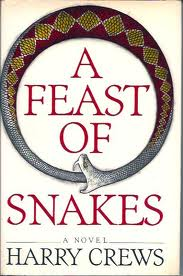 There’s another prominent “cult” author whose hallmark is harsh compassion. That is Harry Crews (1935-2012). Perhaps no work of his demonstrates this quality more clearly than his memoir of growing up dirt-poor in America’s Deep South, A Childhood: The Biography of a Place (1978). Yet it’s also on display in his novels, perhaps most notably in the one that many readers regard as his best, A Feast of Snakes (1976).
There’s another prominent “cult” author whose hallmark is harsh compassion. That is Harry Crews (1935-2012). Perhaps no work of his demonstrates this quality more clearly than his memoir of growing up dirt-poor in America’s Deep South, A Childhood: The Biography of a Place (1978). Yet it’s also on display in his novels, perhaps most notably in the one that many readers regard as his best, A Feast of Snakes (1976).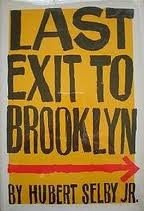 As was Algren, Crews was mordantly funny. In the back-cover blurbs for
A Feast of Snakes
, Joseph Heller referred to Crews as “either our meanest funny writer or our funniest mean writer.” Humor is not as apparent in Selby’s work – but it’s still there. One scene in
LastExit to Brooklyn
portrays a group of rowdy kids wreaking havoc in a slum housing project. It takes place late in the book and provides a dash of levity after much horror before it. In a 1981 interview(which Giles had found informative), Selby himself said, “I have my own personal sense of humor and it’s inherent in the actions, so it just kind of stays there because it’s organic. A lot of people don’t see the humor, although maybe the right word is ‘irony.’”
As was Algren, Crews was mordantly funny. In the back-cover blurbs for
A Feast of Snakes
, Joseph Heller referred to Crews as “either our meanest funny writer or our funniest mean writer.” Humor is not as apparent in Selby’s work – but it’s still there. One scene in
LastExit to Brooklyn
portrays a group of rowdy kids wreaking havoc in a slum housing project. It takes place late in the book and provides a dash of levity after much horror before it. In a 1981 interview(which Giles had found informative), Selby himself said, “I have my own personal sense of humor and it’s inherent in the actions, so it just kind of stays there because it’s organic. A lot of people don’t see the humor, although maybe the right word is ‘irony.’”Nigel Bird explores the same kind of territory in his work – especially with Smoke – and that’s why I enjoy it.
Published on March 22, 2013 09:19
March 20, 2013
Dancing With Myself: DAVID FREED interviews DAVID FREED

When we first met pilot, retired government assassin and would-be Buddhist Cordell Logan, the hero in your first mystery-thriller, FlatSpin, his life was literally in a flat spin. Your second book in the Loganseries is entitled, Fangs Out. Has Loganturned into a vampire?
Nope. No blood-sucking. Logan’s still a financially struggling civilian flight instructor, still residing in converted garage apartment in the lavish Californiaresort town of Rancho Bonita, where he can barely afford to live. The title of the book, by the way, derives from an expression used by fighter pilots who are spoiling for a dogfight.
Everyone seems to love Mrs. Schmulowitz, Logan’s zany, 80-something landlady from Brooklyn, and his kitty roommate, Kiddiot, the world’s stupidest cat. Will they be back in Fangs Out?
Absolutely! I had one reader email and threaten to hunt me down if I got rid of either one. Hell hath no fury like an angry reader.
What was the craziest response you’ve gotten to Flat Spin this far?
You mean, aside from that reader who threatened to do me harm? With rare exception, critics and readers alike have been incredibly positive in their response to Flat Spin. They’ve been the same so far in their assessments of Fangs Out. I was particularly grateful for the New York Journal of Book’s review, which said:
“Told in the first-person, Fangs Out is the second book in the widely acclaimed Cordell Logan series, and like its predecessor is filled with bullet-speed wit, original characters (and a cat to die for), plus a fast-paced and intelligent plotline, climaxing with more than one surprise, especially the surprise on the very last sentence of the book.
“David Freed is a master of mordant one-liners for which Raymond Chandler’s leading man, Philip Marlowe, would have given his eye teeth. Highly recommended for crime and thrillers fans alike.”
Are most of your fans pilots or non-pilots?
Definitely non-pilots, simply because there are a lot more of them than there are those of us afflicted with the crazy flying bug. It’s been especially gratifying, the supportive response that pilots have had to Flat Spin. They can be sticklers when it comes to factual detail. So far, none has taken me to task for technical inaccuracies.
Why do I get the feeling you have a license plate holder that says, "I'd rather be flying." Is it hard for you to sit at your desk and write when it's a cloudless day with no wind?
You have no idea how hard. Virtually Impossible, is more like it. Where I live—in Santa Barbara, California—has the finest, most benign weather on the planet, in my opinion, which makes it an ideal place to fly. I try to get up in the air at least once a week. When I don’t, I start having psychological withdrawal symptoms. Not a pretty sight.
Cordell Logan has a witty, sarcastic, and dangerous edge to him. Agatha and Anthony Award-winning novelist Sara Henry describes him as "stubborn" and "wisecracking." Is he like you?
He is, and he isn’t. I can certainly be stubborn under the right (and sometimes wrong) circumstances, and I’m not beyond cracking wise in mixed company. But, unlike Logan, I don’t regard myself as a violent person. It’s been a long time since I fired a weapon, and any fist clenching I do these days is in response to the sad state of affairs in Washington.
Lots of mystery writers these days spend time on the circuit, going to mystery conferences and doing signings at book stores. How do you decide how and where to promote your books?
I tend to be a rather shy person. I’m not big on drawing attention to myself. Unfortunately, being an author these days, especially a new one like me, entails doing a lot of public appearances if you hope to make your book a success. So, basically, I do what I have to do. I go to conferences. I go to bookstores. But I’m fairly selective in both location and number. In truth, every time I do a signing or sit on a panel, I meet great people. Someday, maybe, I won’t feel like such a self-promoter doing it. What's a secret we would never know about you by reading your books?
I dislike bananas and I essentially distrust all monkeys except, perhaps, orangutans. And I take the latter on a case-by-case basis.
Tell me about Savannahand Cordell. Will they ever get past their "past"?
You’ll have to read Fangs Out to find out!
I know you divide your time between writing non-fiction and fiction. Which is more difficult? Which is more rewarding?
Writing is writing. Whether it’s fiction or nonfiction, my goal is always the same: to write cleanly, clearly, and as compellingly as I can. The reward is not in the end result, but the process. So many writers wish they had the time to write; they’re too busy going to work, trying to pay the bills. I consider myself incredibly fortunate in that regard. Writing is my work. I hope it will be forever.
FANGS OUT SYNOPSIS
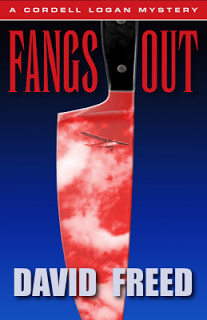 Moments before he is executed, the killer of famed Vietnam War hero-pilot Hub Walker's daughter makes a startling allegation: the real murderer is Walker's close friend, a prominent U.S.defense contractor. Walkerwants to hire somebody willing to spend a few days hunting up information that will refute the convicted killer's groundless but widely reported claims, and help restore his friend's good name. That somebody, as fate would have it, is sardonic civilian flight instructor, would-be Buddhist and retired military assassin Cordell Logan. Thus begins one of the year's most suspenseful mystery-thrillers.
Moments before he is executed, the killer of famed Vietnam War hero-pilot Hub Walker's daughter makes a startling allegation: the real murderer is Walker's close friend, a prominent U.S.defense contractor. Walkerwants to hire somebody willing to spend a few days hunting up information that will refute the convicted killer's groundless but widely reported claims, and help restore his friend's good name. That somebody, as fate would have it, is sardonic civilian flight instructor, would-be Buddhist and retired military assassin Cordell Logan. Thus begins one of the year's most suspenseful mystery-thrillers. A Medal of Honor recipient married to a former Playmate of the Year, Walker resides in the swanky San Diegoenclave of La Jolla, overlooking the Pacific Ocean. Loganis convinced that working for Walkerwill be little more than a paid vacation - a chance to rub shoulders with a living legend while rekindling Logan's relationship with his own enticing ex-wife, Savannah. But after flying to San Diego in his beloved aging Cessna, the Ruptured Duck, Logan is quickly drawn into a vexing and deadly jigsaw puzzle. The deeper he digs, the murkier the truth appears, and the more in danger he finds himself. Who really killed the war hero's daughter, and why? Somebody in "America's Finest City," wants to stop Logan from asking questions, and will stop at nothing to silence him.
ADVANCE NOTICE FOR FANGS OUT
“Told in the first-person, Fangs Out is the second book in the widely acclaimed Cordell Logan series, and like its predecessor is filled with bullet-speed wit, original characters (and a cat to die for), plus a fast-paced and intelligent plotline, climaxing with more than one surprise, especially the surprise on the very last sentence of the book.
“David Freed is a master of mordant one-liners for which Raymond Chandler’s leading man, Philip Marlowe, would have given his eye teeth. Highly recommended for crime and thrillers fans alike.”
--New York Journal of Books
“Freed’s skills as a reporter, screenwriter, and pilot made his first Logan tale (Flat Spin) a delight, and this one continues that roller-coaster pleasure. Loganis a stubborn, wise-cracking, ordinary guy with some extraordinary skills and a passion for flying. He does have a few problems following the Buddha’s precepts on nonviolence, but readers will eagerly look forward to his further attempts to combine flying and detection.”
--Library Journal
“In Freed’s crackling second mystery…the appealing Logan, a wise-cracking, marriage-challenged loner trying to practice Buddhist tenets, proves his mettle as both pilot and investigator.”
--Publishers Weekly
“An intriguing mystery. When Loganis in the air, Freed’s series really takes off.”
--Booklist
DAVID FREED BIO
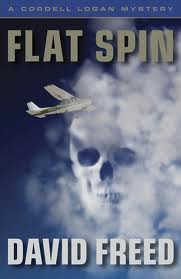 David Freed is a pilot, screenwriter and former Pulitzer Prize-winning journalist for the Los Angeles Times. His work appears regularly in Smithsonian’s Air & Space and The Atlantic, where was honored in 2011 as finalist in Feature Writing by the American Society of Magazine Editors. David has also worked extensively within the U.S.intelligence community.
David Freed is a pilot, screenwriter and former Pulitzer Prize-winning journalist for the Los Angeles Times. His work appears regularly in Smithsonian’s Air & Space and The Atlantic, where was honored in 2011 as finalist in Feature Writing by the American Society of Magazine Editors. David has also worked extensively within the U.S.intelligence community. His debut mystery-thriller, Flat Spin (Permanent Press) was hailed by the Associated Press as “one of the best debuts of 2012,” and by Audiofile as, “one of the funniest books of the year.” His second mystery-thriller, Fangs Out, lands in April.
He lives in Santa Barbara, California.
Published on March 20, 2013 10:53
March 17, 2013
One Man's Opinion: THE BLACK HOUSE by PETER MAY
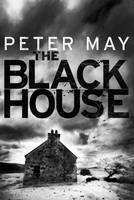
The Black House (US) is, in the main, set on the Isle of Lewis. It’s a harsh landscape with a community culture that is tight and out of the ordinary.
DI Inspector Fin MacLeod is sent to investigate the murder which opens the novel because of possible connections to an earlier case in Edinburgh. For MacLeod this means returning to the childhood home from which he escaped at the first opportunity.
During the investigation, MacLeod revisits links to his past in the form of people and places. As he does, the complexities of his life and the way things might have been close in on him as ever-decreasing circles.
At its core this is a police procedural, and it’s not a bad one at that.
The descriptions of the island are vivid and impressive and made me want to go over at some point.
The characters are all interesting and the murder investigation proceeds with the ups and downs one might expect.
That being said, it is a long book and it did feel it at times.
There are a couple of things that slow things down for me.
First of all, there are the two narratives. The first is in the present and follows Fin as his life crumbles and he chases a killer. The second is told in the first person by Fin as he reflects upon his childhood.
The childhood element is important in many ways, but for me it tended to get in the way. It was a little unsettling to the flow to my mind and might have been better told in a different form, perhaps through the encounters he had as he did his job.
The other aspect that tarnishes things slightly is the way the pieces fit together in ways that seem too clean.
I did enjoy the read. The opening is strong and I really did rattle towards the ending with some urgency where I found I was totally thrown and was very nicely done.
For readers who favour modern British detective fiction this is likely to be a satisfying read. I’d also recommend it to people interested in life on a Scottish Isle.
My suspicion is that the next books in the trilogy are likely to be tighter and more gripping; for me though, I’ll take a rest from Lewis for now and will pick up the thread when I have the leisure of lots of reading time on my hands.
Published on March 17, 2013 10:59
March 15, 2013
The Rocks Below

I have a new work out.
It's 20,000 words long and it's a slight diversion for me in terms of theme and style (or at least I felt it was at the outset - now I'm not so sure).
The theme of the piece is probably where the difference lies. Here's the blurb:
"When Sam hears that the storms along Scotland's east coast, there's only one thing he wants to do - catch the surf. Missing out is not an option. Taking his board out to sea is full of risk.
The storms are even heavier than Sam and he doesn't escape unscathed. Nor do the local towns and beaches which are left battered, damaged and covered in the detritus of the sea, including some rather strange looking rocks the likes of which nobody has ever seen before.
It becomes clear that the local councils will need help in tidying up and the Surfers Against Sewage step forward to restore normality.
In the storm's aftermath, however, there are some unusual happenings occur.
First of all, there are the missing dogs, followed closely by the disappearence of some young children who were last seen playing on the sand. Not to mention the unusual noises that have been keeping people awake at night.
Talk on the streets of Dunbar is that it's Black Agnes returned to take revenge. Others fear environmental catastrophe. Still more cite ancient visions of the end of the world.
The Rocks Below is a tale suitable for adults, young adults and older children. It contains a subtle yet powerful message relating to environmental issues.
Fusing elements of crime fiction, science fiction and adventure stories, this is a book that entertains and stimulates thought in one exciting read."
As you'll see, it's slightly out there. I can explain...
With all my work, I've had to wait for the idea to come. The muse. She came to me after brutal storms on our East Coast and not long after the New York disaster towards the end of last year.
These changes in weather patterns might well be part of some global cycle, but I fear they're more to do with how we live than anything else. That got me thinking about environmental issues.
Just after I had the bare bones of the idea, I was chatting to a friend who explained to me the potential of a number of fracking sites to obtain energy from underground are likely to open up in the near future. The range of reasons to go against this method of obtaining energy seems massive and I can only see money as a motivation for going ahead with such craziness. What a gamble they're taking.
My story now incorporates a strong anti-fracking message. I'm hoping that it will find it's way into the hands of a lot of readers and in some small way might make a difference.
It hopefully stands strong as a story and as a tool for encouraging thought.
Here's the author's note:
Author’s Note
I hope you’ve enjoyed this novella.
If you have, it’s in no small part due to Sam and Martin who have offered great support and advice in relation to surfing, crosswords and the locality. I’d like to thank them here for that help in the knowledge that the story is much more real because of them.
If you haven’t enjoyed it, I’m blaming Sam and Martin.
Other than being entertained by the story, I hope that you’ve come away from it thinking about a range of environmental issues, not least the ways in which the exploitation of energy resources is potentially damaging to the world. I’m not an expert, but it all seems rather dangerous to me and gambling with such things doesn’t seem to make any sense at all.
Maybe you’d like to look into Fracking and decide for yourself – it’s not a simple subject, but one that might be important to you or to your children some day.
Should you decide that you’re not so happy that it goes ahead, why not check out the social media sites and find out what you can do about it? I’m not advocating revolution here, just the possibility of like-minded individuals might come together and becoming all the stronger for it.
My marching days seem to be over. That said I still have a pair of boots to walk in and might just dust them off one of these days. The last time I took to the streets was for the Stop The War protest in London when around a million protestors turned out. It may not have changed what happened, but there was a feeling that it almost did; regardless, I’m glad I went.
Now my protest, or my statement, seems better made through writing.
Here’s hoping it made a difference. You can pick up a copy via these links: US and UK.You can also pick up some of my short stories for free via The Shadows Of Death (US)and Beat On The Brat (and other stories) (US) Thanks.
Published on March 15, 2013 09:51
March 14, 2013
One Man's Opinion: THE RAPIST by LES EDGERTON
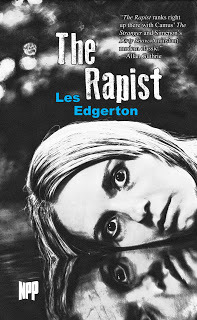
Before business, just to let you know that my latest collection The Shadows Of Death, put together while still under those shadows, is free for a couple of days in the UK and the US.
This next one isn't free, but you'll get your money's worth and more besides. The Rapist:
Les Edgerton’s ‘The Rapist’ (US) is an extraordinary book.
In essence, it describes the events leading up to the protagonist’s incarceration and the time he passes as he waits his final dawn to arrive.
It’s written in a style of yester-year and there are sketches that suggest a contemporary setting; what I feel the author achieves by this juxtaposition is to direct his thoughts to the human condition as it’s always been rather than it might be at any given point.
The main character is an intellectual. A pedant. A philosopher. He is in the middle of a war of attrition against the people he meets, himself and even more importantly with the reader.
It’s like being hit repeatedly by a blunt object as he cajoles and insists and backs up his arguments. There are even times when the guy seems convincing and these are the most disturbing sections of all.
There aren’t many modern books like this, I’m pretty sure. Though it may not always be a fun ride, there’s an element of satisfaction for the reader who takes this on in undertaking such a perilous journey.
I left ‘The Rapist’ battered, bruised and exhausted - what more can one say about a book than that?The links I've used here are to kindle books, but if you prefer your books in paper form there's no reason to worry as it's available in a juicy paperback also.
Published on March 14, 2013 15:50
March 13, 2013
Dancing With Myself: CRAIG WALLWORK Interviews CRAIG WALLWORK
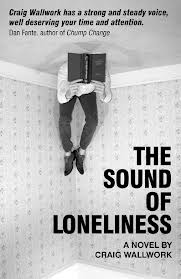
Before I hand over to Craig, I'd like to tell you about a submission opportunity for the follow up to Both Barrels from the wonderful Shotgun Honey team. I was in the first and I'm hoping I'll find some inspiration to take a stab of getting in the second. If you'd like to chance your arm, check out this link - you won't regret it if you do. It's going to be called RELOADED and following the link will tell you everything you need to know.
Other news is that I uploaded a new book at Amazon today. It should become live some time tomorrow. Essentially it's a sci-fi tale for young adults, children and adults alike and it carries (or is supposed to carry) a strong environmental message. The cover I've cobbled together may not be exactly right, but I like it for now.
And here for you now is Craig Wallwork. I've a huge amount of time for this guy and his writing and I've been trying to get hold of him for a long time. If you like what you read, check out the links at the end of the piece; one of them will take you to an excellent short story that you can download for free.
A very warm welcome to you Craig. Over to you...
Q: You seem to have arrived on the writing scene with a bang: a short story collection out last year, and two novels out at the beginning of 2013. Would you describe yourself as an overnight success?
A: Hell no. This short flurry of success is about ten years in the making. That’s the thing with these so-called overnight successes; people forget about the years leading up to that point and how they were filled with self-doubt, anger, rejection, late nights, exhaustion, and hopelessness. What everyone sees a moment of correlation that that is, metaphorically speaking, just a Band Aid hiding the scars of their endeavours.
Q: Your recent novel The Sound of Loneliness has been compared to Catcher in the Rye and the works of Dostoevsky and Thomas Bernhard. Not bad company to be in.
A: Yeah, it's nice to read, especially when it features names like Dostoevsky, and though I'm honoured that people have drawn such comparisons, it's important to understand that writing a story about a young man who is embittered and/or repulsed by society, and filled with angst, is going to end up being lumped with such books, and not necessarily a reflection on a book's strength. It's not to say my book isn't as good, or won't resonant through time like the others, but only that it is similar in subject matter. Such associations become the default response for people, like there is a NEED to make a comparison so you get a better understanding of what the story is about. You get it a lot in movies. For example: Inception is "like" The Matrix meets James Bond. Well, maybe, but it's tenuous. For this reason, The Sound of Loneliness being hailed as this generation's Catcher in the Rye just because it shares certain themes is silly. As a writer friend pointed out to me, Holden was without aspirations and just sort of whining and wandering, whereas Daniel Crabtree had an overblown sense of purpose. Quite different. Nonetheless, it's very flattering people are linking great literary works with my own.
Q: You describe yourself as a filmmaker, artist and writer. Should we expect you to be directing an adaption of one of your novels in the near future, as well as designing the poster?
A: It would be nice to direct something, but I could never manage holding down a full time job and directing a movie. I’ve reached an age where keeping a roof over my head and food in my family’s stomachs is more important to me than chasing a dream. The poster design is more achievable with little to no impact on my normal life. I have done a few promotion posters for my novels in the past, and was instrumental in the artwork for The Sound of Loneliness. Maybe I’ll get more opportunities to flex my creative muscles in future works. Who knows.
Q: Your new novel To Die Upon a Kiss will be published by Snubnose Press on March 22. They're known for publishing hardboiled crime and noir novels. Is this a genre you're going to concentrate on?
A: I’m trying my best not to be pigeon-holed as a genre writer. I know a lot of authors who are keen to concentrate on one particular genre, to hone their skills and become revered in that chosen area. Like Nik Korpon. He writes these great little hard-boiled/noiry/pulpy-type stories and novels. And they work because he’s studied the masters of that genre. He knows the rules, the beat and the darkness that hides behind the curtain of literature. Me, I just fell into noir by accident. I can’t see myself writing anything akin to Chandler, or James M. Cain or Jim Thompson. Nik will.
Q: What's Brit Lit?
A: It’s celebrating the successes of British authors, in particular those who have a “don’t give a fuck” attitude and push against the mainstream. It’s not discounting the achievements of British authors like David Mitchell, Jonathan Coe, Martin Amis, Will Self and Zadie Smith, to name a few of our venerated writers, but more pushing them to the side for a moment and allowing a new breed to come through. People like Tony O'Neill, Joe Dunthorne, and more edgy and fresh voices like Ray Banks, Tony Black, Jonny Gibbings, Ian Hough and of course, Nigel Bird. I hope someone is kind enough to include me among those great writers to, but at the moment I'm just happy to be a English writing, watching these great authors receiving critical success.
Q: The titles to two of your books, Quintessence of Dust and To Die Upon a Kiss, are lines taken from Shakespeare plays. Are you a big fan of the Bard?
A: I’ve read a few of his plays but nothing really sticks with me. That’s the literary equivalent of treason, right? I don’t care. He’s the master, sure, but I’d much rather read a book like the Suicide Shop by Jean Teulé than agonise over Shakespeare. The titles came about because they’re great for search engines.
Q: What's your favourite part of the writing process?
A: Making myself laugh, or being taken aback by the character's behaviour and how they change the plot dramatically. Yes, I enjoy it when the characters surprise me.
Q: What's your least favourite part of the writing process?
A: Promotion.
Q: Do you have a daily writing routine?
A: No. I’m not that prescriptive. Sitting in front of the computer every day, trying to write; that’s not healthy for a writer. The only thing I do consistently everyday that is related to writing is to change my word of the day calendar. I have it on my desk at work. Every morning I get in, sit down, and tear off yesterday’s date. I then try my best to memorise that day’s word. Today’s was Grand Guignol, meaning "dramatic entertainment featuring the gruesome or horrible".
Q: What is your big goal when it comes to your writing?
A: To be completely happy with what I’ve written. I have yet to achieve that goal.
Q: Do you consciously take risks on the page? A: Calculated risks, yes. I don't go all out to shock, contrary to what people might think reading my work, especially my short stories. I just don't clip my wings. But I think without risks, a writer deprives themselves of possibility and adventure. Without risks, the writer is no different than the paraphrasing translator for the deaf.
Q: Have you ever written something and stopped, and thought, "Man, I don't know if I can put this out there." And then, did you anyway?
A: I was worried about one short story I wrote called Nazareth House. On the surface it could be misconstrued as a story about Jesus Christ having sex with an acrophobic woman. A lot of research went into the story and in particular the back history of the Incubus. But I know how these things work, and when the story was finished I read it over and thought, Yep, they’re just going to think I’m a blaspheming pervert that should burn in Hell! The magazine had reservations about publishing it, but did it anyway. I really admired them for that.
Q: Who is your favourite author, and if there was one question you could ask them, what would it be?
A: I don't have a favourite author. I have favourite books but the authors of those books are never consistent enough for me to want, or love, EVERY book they've written. I would like to share a cup of tea with Harper Lee. I wouldn't even talk about To Kill a Mockingbird. I would probably end up asking her why only one book, which is probably the question she gets asked the most, if you're lucky to ever be in the same room with her. The problem I have with authors in general is, I'm not that bothered or interested in them. I certainly don't want to know more about their books, like, what ever happened to the character etc. I met Fight Club author Chuck Palahniuk once in Leeds. I had no idea what to ask him, or talk to him about. So when it came to the part where he signed my books, and I had to engage in small talk, I asked him if he remembered doing a gig in the US and a guy named Chris. Chuck just looked at me like, Is that the best you can do?
Q: Tell me something you wouldn't want to admit publically.
A: I’m using my four year old daughter to help me learn how to read. I know how to read, but I’m not very good at reading aloud. I realise that being an author means you may have to do a reading once in a while. The nights I take my daughter to bed, I read her a book and practice the delivery, pace and intonation. Julia Donaldson has been a real help in this too.
Craig Wallwork is the Pushcart nominated author of the novels The Sound of Loneliness (US) and To Die Upon a Kiss, and the short story collection Quintessence of Dust.(free from Smashwords). He is also the fiction editor of MenacingHedge Magazine. He lives in West Yorkshire, England, with his wife and daughter.
Published on March 13, 2013 08:59
March 7, 2013
Dancing With Myself: DAWN REEVES interviews DAWN REEVES
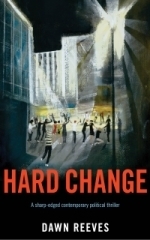
A quick plug, if I may, for Mr Suit. It's free today from these links - UK and US.
And now, I have a dance for those looking for exciting new talent. If that's you, prepare to be excited. Dawn Reeves, ladies and gentlemen:
What story does Hard Change tell?
The one-line description of the story was the hardest thing to write but it totally captures what’s at the heart of it: “When a girl’s body is dumped in a bin, a city is forced to explore the boundaries of private interest and public good…” The novel focuses on the gripping ramifications of a murder, it pokes around in the workings of power, shines a light on how markets out of control foster crime, crashes around in the system and speculates how individual and collective action can make a difference. The characters and their families, the organisations – (the police, the local authority, the Health service,) the neighbourhood and the city itself all have their own stories that are driven by the incident. The stories are twisted together; inescapable for the characters and hopefully compelling for the reader.
What’s different about it?
It isn’t a traditional political thriller, it’s not international, it’s not Westminster, it’s local and personal politics but it’s about big picture questions – the sort of society we want to live in. I’ve called it a town hall thriller as that where its mainly set, its not a new genre but I don’t think there are that many books that live in that sticky mire. Hard change is about strategy rather than procedure, it’s about work, important work done by real people under major stress where the suits – like I used to be - are heroes and villains.
Where did the story start?
I worked with a group of managers trying to turn around a chaotic city centre, it included council planners, police, licensing managers, public health experts, bar and night club owners. When someone said, “and there are the kids in the bins,” my ears pricked up. The shocking thing was that they didn’t blink. The inference was that kids end up in bins, for all sorts of reasons, so what? It’s so common that there are national guidelines on emptying bins in town centres, bin men are required to bang on the side of the tubs. If the kids aren’t dead or if they aren’t discovered, they might well be through a transfer station, compacted or sent as waste to India. I had to write a story about that.
Where are the thrills?
Pages 1, 16, 23, 38, 50, 65, etc – (sorry) there’s no formula or algorithm. It depends on the reader – for me the thrills are in the places where life speeds up, where it skirts the edge of tragedy, where the life or death aspects of work (for people not in uniform) suddenly crystallises and where the political gets personal. There’s a lot of alcohol in the mix and current readers seem to find the last 150 pages fly past in a blur.
Who’s to blame?
Society – (of course) there is such a thing and we are it. We live it, our decisions affect everyone around us, we are all connected and we choose to engage with it or not. We try and influence it or not. Yes there are criminals and crimes, good organisations and bad ones but at one of the critical points in the book – the question the characters have to deal with is: what is our bit of this story and are we collectively prepared to try and change the ending – could we prevent another murder? Hard change indeed.
What’s the point?
I’ve worked in and around town halls for 20years. The reason I was so motivated to write about public service is because it’s something I’m proud of in the UK and because it’s under attack. Its constantly undermined by government policy and the press, Council’s are set up to fail, services are portrayed as being only for people who can’t afford to buy them privately, the dominant narrative is that its run by idiots who don’t care and as for the lie of fat cats in town halls doing nothing – compared to the damage done by bankers – don’t get me started.
People in public service are the same as anyone else; they want to do a good job, and care about what they do and in the main are trying hard in difficult circumstances to make a difference. There has to be a system and the system has to work for everyone but I don’t accept the idea that Society is broken and that it’s all crap – it isn’t. It’s flawed but that’s because we’re all a bit flawed aren’t we? I am and so are my characters.
Where is the story set?
Not telling! I’m chuffed that readers so far have guessed that it’s set in at least 5 different UK cities. It’s an amalgamation of places I know and love. I wanted it to be meaningful enough for readers to connect with the environment without it being bland or anytown. And I didn’t want to make up a fictitious name – too embarrassing.
Writer or dancer?
Dancer first, any kind, to house music mainly. I also love tap dancing, salsa but not tango. Had my first tango in Paris recently – too intense and controlled. Writer second – I’ve tried painting, poetry and stand up comedy too.
What’s on the soundtrack to the novel?
Great tunes - e.g. The Bottle – Gill Scott Heron and Brian Jackson, Food for thought –UB40, Get up off our knees – Housemartins, Walls come tumbling down – Style Council, Ring my bell - Blood sisters, Lola’s theme – Shapeshifters, You can get it if you really want it –Jimmy Cliff. Hard rain’s gonna fall – Bryan Ferry, Lisa Stansfield and Coldcut – People Hold On.See my blog for the full list…
What next?
A clash of moral codes, the edge of duty, a siege, a former child soldier playing for a championship club, child poverty and I’m back in the boiler room at the town hall.
Hard Change is available from Amazon stores in the UK and US for kindle, as well as in paperback form (US and UK)
Published on March 07, 2013 23:32



